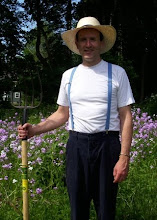Since I last posted, strawberries have come and gone. One weekend we picked 6 quarts of strawberries at our CSA and dehydrated all of them. We ended up with only 7 cups after processing. These work great on cereal or in trail mix. They go too quickly when snacked on alone. Alas, I don't think that any will make it through to winter, or even late summer.
I harvested a large bowl of kale last weekend and tried a "recipe" for kale that I have been planning. I have heard various authors rave about the taste of kale that is sprinkled with tamari then dehydrated to a crisp -- "kale chips". Now I am a believer. My daughters thought that the kale chips were great and consumed them in large quantities. The texture is unlike anything I have had before, but similar to other crisp, crunchy treats. Because the kale is dehydrated at a low temperature, healthy enzymes are retained. This makes it a much superior alternative to potato chips. I will have to plant more kale, so that we can have plenty of chips handy for snacking.
Our snap peas were finished a week ago, but several gardeners that I know are still harvesting. This morning, I harvested two humongous bowls of lettuce and gave one to my neighbor.
We are just past midsummer now and I am coming to realize that in my climate (WNY), I should be making regular plantings of root and leaf vegetables up to this time in order to assure a plentiful continuing harvest into the late fall and winter months. Last year, I waited to sow fall crops until September and had very few vegetables that even germinated. One of the key things to understand is that vegetable growth slows considerably as the days get shorter and temperatures cool. By late August, the sun will be setting at 8PM. Though the daytime temperature will be comfortable most days into October, the nightime temperature will be cool and the soil temperature will begin to drop, making it difficult for seeds to germinate.
Last week around the solstice the following plants were blooming: the ubiquitous day lily, creeping bellflower (closely related to harebells), pink spirea, onions, and potatoes. Wild raspberries are appearing as immature red clusters. The self-seeded morning glories that I worried over a month ago are now making their way out of the undercover and up the fence.
Wednesday, June 30, 2010
Subscribe to:
Post Comments (Atom)


No comments:
Post a Comment